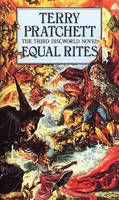 Don't you love Terry Pratchett books? I do, despite never having read any in my teenage years, and Nation, a non-Discworld story, is no exception. Set in an alternate universe (or a parallel universe, if you like), this is the story of a young boy (Mau) whose homecoming has been ruined by a massive tidal wave, which has completely destroyed his village. There are no survivors, but him; and then he meets another survivor - from a shipwreck. Daphne, a posh British girl, with some royal blood, who doesn't speak the same language as Mau, nor is she accustomed to his kind of lifestyle.
As they try getting acquainted with one another, Pratchett exploits the humour surrounding language and cultural differences, keeping the reader thoroughly entertained; be it Daphne cooking for him, or him not realising what pointing a gun at him meant; be it the importance of trousers or the lack of clothes altogether.
Don't you love Terry Pratchett books? I do, despite never having read any in my teenage years, and Nation, a non-Discworld story, is no exception. Set in an alternate universe (or a parallel universe, if you like), this is the story of a young boy (Mau) whose homecoming has been ruined by a massive tidal wave, which has completely destroyed his village. There are no survivors, but him; and then he meets another survivor - from a shipwreck. Daphne, a posh British girl, with some royal blood, who doesn't speak the same language as Mau, nor is she accustomed to his kind of lifestyle.
As they try getting acquainted with one another, Pratchett exploits the humour surrounding language and cultural differences, keeping the reader thoroughly entertained; be it Daphne cooking for him, or him not realising what pointing a gun at him meant; be it the importance of trousers or the lack of clothes altogether.
As more people seek refuge in the 'Nation', the tone of the book changes. The humour remains, but the book takes a more philosophical turn, exploring ideas of nontheism, as Mau's faith gradually evolves - from hating the gods for taking away the Nation to figuring out the importance of belief. As the two children grow up gradually, the nature of responsibilities they take on, for both - themselves and the people on the island - increases. Mau leads the people as they look for answers, while Daphne learns about breastfeeding, child-bearing and looking after the children of the other women on the island.
I did enjoy this book, despite the last chapter tying things up all too neatly. At the same time, it's important to remember that this is a young adult book, so that should not be surprising.
 Terry Pratchett's Equal Rites is the third book of the Discworld series, and, it's the first Discworld book that I have read.
Equal Rites explores the world where women cannot be wizards, and men cannot be witches. However, when a dying wizard visits a blacksmith, things in the wizarding world are about to change. The blacksmith is the eighth son, and his wife is about to give birth to their eighth son - perfect for the dying wizard to pass on his staff. Granny Weatherwax, a central character, who helps bring the baby into world, takes the baby to the smith, who makes it grab the staff. The old wizard dies, but, what the smith failed to realise is, the newborn baby blessed with magical wizard powers is a girl!
Terry Pratchett's Equal Rites is the third book of the Discworld series, and, it's the first Discworld book that I have read.
Equal Rites explores the world where women cannot be wizards, and men cannot be witches. However, when a dying wizard visits a blacksmith, things in the wizarding world are about to change. The blacksmith is the eighth son, and his wife is about to give birth to their eighth son - perfect for the dying wizard to pass on his staff. Granny Weatherwax, a central character, who helps bring the baby into world, takes the baby to the smith, who makes it grab the staff. The old wizard dies, but, what the smith failed to realise is, the newborn baby blessed with magical wizard powers is a girl! Background:
Background: